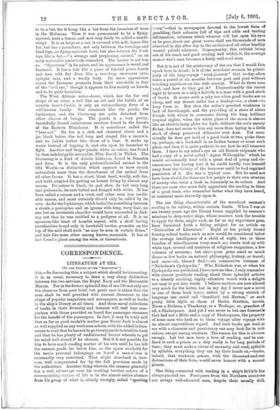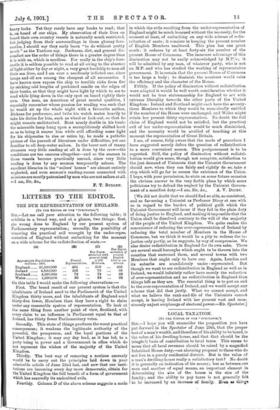CORRESPONDENCE.
LITERATURE AT SEA.
[To TH2 EDITOR 01 THZ SPZCTATOX."]
S111,—In discussing this, a subject which should be interesting, it is, as usual, necessary to draw a very sharp distinction between the two services, the Royal Navy and the Mercantile Marine. For in the former splendid line of sea-life not only are the absences from port brief, but great care is taken that the men shall be well provided with current literature in the shape of popular magazines and newspapers, as well as books in the ship's library at all times. And these naval collections of books in their diversity and interest will well bear com- parison with those provided on board fine passenger steamers for the benefit of the passengers. In fact, it may be truly said that as far as good readable matter goes Naval Jack is almost as well supplied as any workmen ashore, with the added induce- ments to read that he has not to go twentyyards tofetch his book and that he has plenty of undistracted leisure wherein to get his mind well stored if he chooses. But it is not possible for him to have much reading matter of his own until he has left the seaman grade far below him, as the space available for the men's personal belongings on board a man-o'-war is necessarily very restricted. That slight drawback is, how- ever, well compensated for by the full provision made by the authorities. Another thing wherein the seaman generally has a real advantage over his working brother ashore of a corresponding station of life is in the almost entire absence from his grasp of what is, utterly wrongly, called "sporting
news,"—that is, newspapers devoted to the lowest form of gambling, their columns full of tips and odds and touting information, columns which whoever will but open his eyes as he goes about our great towns shall see thousands of men absorbed in day after day to the exclusion of all other healthy mental pabula whatever. Consequently, this rubbish being out of his reach and good reading well within it, the average man-o'-war's man becomes a fairly well-read man.
But it is not of the aristocracy of the sea that I would fain speak here in detail; it is of the merchant seaman, he princi- pally of the long-voyage " wind-jammer " that to-day often takes a period of six months between port and port without touching anywhere on the wide seaway. What do these men read, and how do they get it? Unquestionably the rarest sight to be seen in a ship's fo'c's'le is a man with a good stock of books. It seems such a pity too when good books are so cheap, and any decent sailor has a donkey—i.e., a chest—to keep them in. But then the sailor's greatest weakness is lack of forethought, and the providing of a store of silent friends with whom to commune during the long brilliant tropical nights, when the white glare of the moon is almost like an electric-lamp globe for light, without the arc's uneasy flicker, does not occur to him any more than laying in a little stock of cheap preserved delicacies ever does. Yet occa- sionally he does get hold of a good book or two, picks them up, perhaps, on a bookstall in an Indian bazaar or some such place, and then it is quite pathetic to see how he will treasure them. I have in my mind's eye an old Danish shipmate who had a copy of a novel called " Agnes Willoughby," which he would occasionally lend with a great deal of pomp and cir- cumstance, but having lent it he could hardly tear himself away from the vicinity of the borrower until he had regained possession of it. His was a typical case. But he need not have been afraid, for there are few people in their own stratum of society who treat a book so humanely as do sailors. And there are none who more fully appreciate the reading to them of a good book, who remember better what they have heard, or comment more shrewdly upon it.
The one thing characteristic of the merchant seaman's reading is its variety, within certain limits. When I was at sea twenty years ago the library boxes supplied by seamen's missions to deep-water ships, whose masters took the trouble to apply for them, might each, as far as my experience goes, have furnished forth a fitting subject for an article on " Curiosities of Literature." Eight or ten primly bound Sunday-school books, such as now would be considered below the average intelligence of a child of eight, two or three bundles of miscellaneous (very much so) tracts tied up with white tape, several odd numbers of religious magazines, a few volumes of sermons; but also—pure gems amid so much dross—a few books on natural philosophy, history, or travel; and once—oh, blessed find !—six consecutive volumes of "Nicholson's Cyclopmdia." Who Nicholson was, or when his Cyclopmdia was published, I have now no idea; I only remember with utmost gratitude reading aloud those splendid articles to a silently smoking, raptly attentive watch with a. delight not easy to put into words. I believe matters are now altered very much for the better, but in my day I never saw a novel in one of those book boxes, unless by a strong stretch of language one could call " Sandford and Merton," or such pretty little idylls as those of Hesba Stretton, novels. Never a Dickens, a Thackeray, or a Trollope, or, grandest of all, a Shakespeare. And yet I was never in but one forecastle that had not a Bible and a copy of Shakespeare, the property of some man who held on to them voyage after voyage with an almost superstitious regard. And such books get read akt sea with a closeness and persistency one may look for in vain ashore, except among students. The reason for this is obvious enough. Let but men have a love of reading, and be con- fined to such a prison as a ship really is for long periods of time ; they must make a virtue of necessity and read, syllable by syllable, everything they can lay their hands on,—books, indeed, that workmen ashore, with the thousand-and-one distractions of their lives, would never honour with a second glance.
One thing connected with reading in a ship's fo'c's'le has always puzzled me. Foreigners from the Northern countries are always well-educated men, despite their usually dull, heavy looks. Yet they rarely have any books to read; that is, on board of our ships. My observation of their lives on board their own country vessels is naturally much restricted, but judging from their surroundings in those gloomy fore- castles, I should say they early learn "to do without pretty much " as the Yankees say. Darkness, dirt, and general dis- comfort are the order of things there in a greater degree than it is with us, which is needless. For really in the ship's fore- castle it is seldom possible to read at all owing to the absence of light either by day or night, a very great hardship to men all their sea lives, and I am sure a needlessly inflicted one, since lamps and oil are among the cheapest of all necessaries. I have known men expose the ship to terrible risks from fire by sticking odd lengths of purloined candle on the edges of their bunks, so that they might have light by which to see to read while lying down in the only spot on board rightly their own. One man, an American of great mental qualities, I especially remember whose passion for reading was such that he would sit up the whole night with a favourite author, Dickens for preference, and bribe his watch mates heavily to take his duties for him, such as wheel or look-out, so that he might remain undisturbed. Bent nearly double in his bunk, the miserable lamp hung upon a surreptitiously shifted hook so as to bring it nearer him while still affording some light for his shipmates to rise or retire by, he made a pathetic picture of the pursuit of literature under difficulties, yet one familiar to all deep-water sailors. In the baser sort of tramp steamers very little reading at all is done by the crew—the conditions are too onerous altogether—and so the seamen in these vessels become practically unread, since very little reading is done by any seaman temporarily ashore. The excellent libraries in the " sailors' homes " are almost entirely neglected, and even seamen's reading-rooms connected with missions are mostly patronised by men who are not sailors at all. .—I am, Sir, &o.,
F. T. MILLEN.



















































 Previous page
Previous page